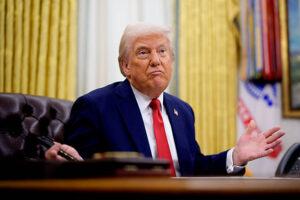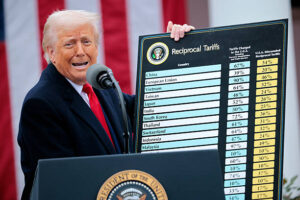
| Emmanuel Barasa |
African lobbyists are renewing their call for comprehensive global financial reforms to
address longstanding economic disparities.

This renewed push emphasizes the need for a more equitable financial system that supports sustainable development in Africa. “The current global financial architecture is skewed against developing
countries,” stated Dr. Ngozi Okonjo-Iweala, Director-General of the World Trade
Organization (WTO). The call comes amid growing concerns over debt sustainability,
access to capital, and the impacts of climate change on African economies.
Lobbyists argue that reforms are essential for achieving inclusive growth and
economic resilience.
One of the key demands is the restructuring of international financial institutions,
such as the International Monetary Fund (IMF) and the World Bank. African leaders
and economists advocate for more significant representation and influence in these
institutions to ensure their policies and programs reflect the needs of developing
countries. “Reforming the governance structure of global financial institutions is
crucial for fairer decision-making,” noted Makhtar Diop, Managing Director of the
International Finance Corporation (IFC). Enhanced representation would enable
African countries to have a stronger voice in global financial decisions. This change
is seen as a step towards a more balanced global economy.

Debt relief and sustainable financing are also central to the lobbyists’ agenda. Many
African countries face significant debt burdens that hinder their development
prospects. “Debt sustainability is critical for our economic stability and growth,”
emphasized Kenneth Ofori-Atta, Ghana’s Finance Minister. Lobbyists are calling for
mechanisms that provide more favorable borrowing terms and access to grants
rather than loans. These measures would help African nations invest in crucial
sectors such as health, education, and infrastructure without exacerbating their debt
challenges.
The impact of climate change on African economies is another pressing concern
driving the call for financial reforms. African countries, despite contributing minimally
to global greenhouse gas emissions, are among the most vulnerable to climate
impacts. “We need climate finance that addresses the disproportionate burden on
Africa,” stated Wanjira Mathai, Vice President and Regional Director for Africa at the
World Resources Institute. Lobbyists are advocating for increased climate financing,
including grants and low-interest loans, to support adaptation and mitigation efforts.
This financial support is vital for building resilience against climate-related shocks.
Trade and investment policies also feature prominently in the reform agenda. African
countries seek fairer trade terms and greater access to international markets to
stimulate economic growth. “Trade reforms are essential for unlocking Africa’s
economic potential,” remarked Albert Muchanga, African Union Commissioner for
Trade and Industry. Lobbyists are pushing for the removal of trade barriers and more
supportive policies that facilitate exports from African nations. Improved trade
conditions would help diversify economies and reduce reliance on a narrow range of
commodities.
Another critical aspect of the reforms is enhancing financial inclusion and access to
capital. Many African entrepreneurs and small businesses struggle to secure
financing due to stringent requirements and high-interest rates. “Financial inclusion is
key to empowering our people and driving economic growth,” highlighted Vera
Songwe, Executive Secretary of the United Nations Economic Commission for Africa
(UNECA). Lobbyists advocate for initiatives that increase access to affordable
financing for small and medium-sized enterprises (SMEs). Such measures would
stimulate innovation and job creation across the continent.
The call for global financial reforms also underscores the need for transparency and
accountability in financial flows. Illicit financial flows and corruption undermine
development efforts by diverting crucial resources. “Combating illicit financial flows is
essential for sustainable development,” noted Dr. Mukhisa Kituyi, former Secretary-
General of UNCTAD. Lobbyists are urging for stronger international cooperation to
tackle these issues and ensure that resources are used effectively. Transparent
financial practices would enhance trust and stability in African economies.
The push for reforms has garnered support from various international partners and
organizations. The United Nations and the African Development Bank (AfDB) are
among the institutions backing these calls. “Global financial reforms are vital for
achieving the Sustainable Development Goals (SDGs),” emphasized Amina J.
Mohammed, Deputy Secretary-General of the United Nations. Collaborative efforts
between African leaders and international partners are crucial for driving the reform
agenda forward. Such partnerships can help mobilize the necessary political will and
resources.

The timing of the renewed call for financial reforms is seen as strategic, given the
ongoing global economic challenges. The COVID-19 pandemic has highlighted the
vulnerabilities of developing economies and the need for a more resilient global
financial system. “The pandemic has shown us the urgent need for financial
reforms,” stated Kristalina Georgieva, Managing Director of the IMF. African
lobbyists believe that the current global context presents an opportunity to advocate
for meaningful changes. The push for reforms is aimed at creating a more equitable
and sustainable financial future.
In conclusion, the renewed call for global financial reforms by African lobbyists aims
to address critical issues such as debt sustainability, climate finance, and fair trade.
The emphasis is on creating a more inclusive financial system that supports
sustainable development and economic resilience in Africa. “We must seize this
moment to advocate for a fairer financial system,” urged Dr. Akinwumi Adesina,
President of the African Development Bank. The success of these efforts will depend
on the collective commitment of African leaders and international partners. Achieving
these reforms is essential for building a prosperous and equitable global economy.





